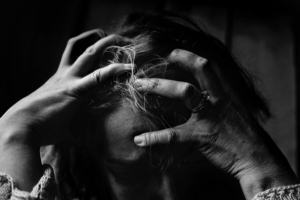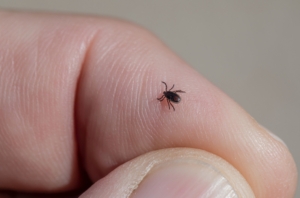Why Does Morgellons Disease Make Me So Tired?
You’re trying to work, but the work isn’t happening. Concentration flits in and out, allowing you to only make mild headway on what you’re supposed to be doing. The dishes and the laundry are stacking up. You haven’t the energy to shower. You’re so tired. All the time. And you’ve been tired for weeks, maybe even months.
When will this chronic fatigue go away?
 If you have Morgellons disease, the above description may sound too familiar. Many Morgellons patients haven’t even thought that fatigue and an inability to concentrate could be tied to a physical ailment that’s all too often categorized as a mental disease.
If you have Morgellons disease, the above description may sound too familiar. Many Morgellons patients haven’t even thought that fatigue and an inability to concentrate could be tied to a physical ailment that’s all too often categorized as a mental disease.
After all, it’s always easy to find another culprit for your tiredness. Maybe you blame how you’re feeling on not getting enough sleep. Maybe you just think you’re in the wrong state of mind. Maybe you think you’re overly busy. Could be that you tie it to just getting older.
But you may be selling yourself short.
Morgellons disease is typically characterized by slow-healing open sores and colored filaments embedded in and protruding from the patient’s skin. However, patients also experience all-consuming fatigue and many symptoms of chronic inflammation.
Because many of these symptoms are non-descript, Morgellons patients are frequently misdiagnosed for other ailments and don’t receive the treatments they desperately need.
Morgellons is pathological—not psychiatric. Patients must be treated with antibiotics, not antipsychotics, to manage their symptoms. Until patients can resolve the underlying infection, they will be trapped in a never-ending inflammation/fatigue cycle.
In this article, The Charles E. Hollman Morgellons Disease Foundation will explore how the underlying bacterial infection triggers symptoms of inflammation and the resulting fatigue and what this means for patients with the disease.
Inflammation
Generally, inflammation is the body’s process of responding to an irritant. The irritant could be an invader like a bacteria or virus or a foreign object like a splinter. The inflammation process starts when our bodies are trying to fight off the irritant.
The inflammatory immune response involves a highly coordinated series of molecular communications between different immune cells and blood vessels. These communications cause:
- Fever
- Redness
- Swelling
- Pain
- Loss of function
What happens when you have inflammation
There are many different immune cells involved in causing inflammation. These cells release “inflammatory mediator” hormones that send signals to small blood vessels in the tissues to open up. As the blood vessels dilate or become more expansive, more blood can reach the injured area. This is why inflamed areas become red and feel hot to the touch.
Increased blood flow also allows more immune or white blood cells to flood the area where they can fight invaders and start the healing process.
Inflammation mediators or chemical signals make it easier for white blood cells to squeeze through the walls of blood vessels so that they can enter the infected tissues. When the white blood cells enter the tissues to attack and remove infectious invaders like bacteria or viruses, more fluid also enters the tissues causing swelling.
Inflamed areas of the body often become painful to the touch because the inflammatory signaling hormones also trigger pain receptor nerves, sending pain signals to the brain. The more the inflammation hurts, the more likely the patient will be to protect the injured area.
Swelling and pain aren’t the only symptoms patients experience during inflammation. Patients who are fighting an ongoing infection may also experience extreme fatigue.
Fatigue
 Fighting off an ongoing infection takes a lot of energy; as a result, the body changes how it accesses nutrients to get necessary energy faster. Unfortunately, the short-cut pathways our bodies use to access energy under stress are much less efficient than those used when the body is not sick. As a result, patients fighting ongoing infections may become extremely tired.
Fighting off an ongoing infection takes a lot of energy; as a result, the body changes how it accesses nutrients to get necessary energy faster. Unfortunately, the short-cut pathways our bodies use to access energy under stress are much less efficient than those used when the body is not sick. As a result, patients fighting ongoing infections may become extremely tired.
Patients suffering from chronic fatigue may feel so depleted that they can’t manage their everyday lives—and this intense exhaustion can last for months or even years. Chronic or persistent fatigue is different from acute fatigue.
Acute fatigue is a healthy, adaptive response to physical or mental exertion. Persistent fatigue doesn’t go away after sleeping in on the weekend or taking an extra nap in the afternoon.
Patients with persistent fatigue may find it hard to get up in the morning to go to work or do their regular daily activities. Instead, they muddle through, fighting an intense urge to sleep. When patients try to sleep, they may never feel fully rested or refreshed despite being asleep for hours.
Those suffering from persistent fatigue may develop depression, lack motivation, and become anxious as their symptoms persist.
Relationship between fatigue and inflammation
Inflammation triggers a change in metabolism—how the body makes and uses energy—which causes fatigue.
Patients suffering from persistent infections experience prolonged inflammation, causing an increase in insulin resistance, reduced glucose uptake by white blood cells, and less overall energy production.
The body uses nutrients from the foods we eat to create the energy necessary to run our physiological processes and help us live our daily lives. When experiencing prolonged infections and the resulting inflammation, the body diverts energy from other systems to support the immune system.
Essentially, fighting an ongoing infection triggers inflammation, and the accompanying fatigue forces the patient to rest to conserve energy for the massive immune response.
What does this mean for Morgellons patients?
Among the long list of symptoms that Morgellons patients experience, debilitating fatigue resulting from an intense inflammatory response is near the top of the list.
Morgellons patients can be profoundly tired, so much so that they cannot work or even care for themselves. Patients may also experience painfully swollen joints and intense muscle pain triggered by a prolonged inflammatory response. These symptoms may last for months or even years without letting up.
 Despite what the CDC and the mainstream media report, many studies have found that Morgellons patients suffer from an ongoing bacterial infection. Nearly all Morgellons patients have tested positive for Borrelia burgdorferi, a spirochetal bacteria spread through bites from the Black-legged tick—the same tick that causes Lyme disease.
Despite what the CDC and the mainstream media report, many studies have found that Morgellons patients suffer from an ongoing bacterial infection. Nearly all Morgellons patients have tested positive for Borrelia burgdorferi, a spirochetal bacteria spread through bites from the Black-legged tick—the same tick that causes Lyme disease.
Left untreated, the infectious spirochete spreads throughout the patient’s body, triggering inflammation and causing damage. These specially adapted bacteria can swim through dense tissues and outrun immune cells as they disseminate. In patients with ongoing infections, spirochetes have been found in the heart, joint, muscle, and brain tissues.
As the patient’s immune system battles the invading spirochete, energy packets are diverted from functional systems to the front lines of the immune response, leaving the patient literally drained and unable to exert any extra energy toward living their daily lives.
Until the patient can get the underlying infection under control, they will never be able to break the inflammation/fatigue cycle and will continue to suffer. The Charles E. Holman Morgellons Disease Foundation and thousands of people with Morgellons disease need your help.
Your donations fund critical research and provide educational opportunities and resources for those with this debilitating disease. Please consider donating today to help us release more Morgellons patients from the grip of inflammation and fatigue cycles.

